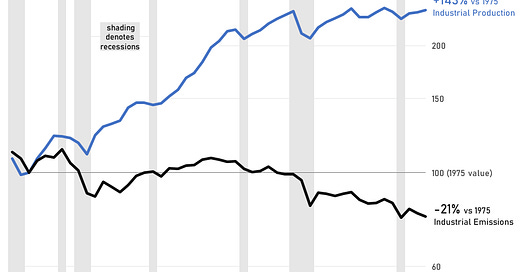Industrial production 📈; Industrial emissions 📉
Emissions "decoupled" from from economic growth in the 90s, but industrial sector emissions decoupled from industrial production much earlier
Plenty has been written on the “decoupling” of greenhouse gas emissions and overall economic growth. Many people incorrectly assume that United States’ emissions decoupled from its economy because of de-industrialization and outsourcing; however, that ignores the fact that industrial production has grown a lot since the golden age1 of U.S. manufacturing might.
Interestingly, emissions from the industrial sector have fallen considerably even while industrial production marched upwards.
So why did this happen? Great question, and there are likely a lot of reasons:
The 1970s energy crisis happened - after President Carter’s famous energy speech, the U.S. did get a lot more efficient.
Fuel mixes changed - the industrial sector used to use a lot of coal, but now uses much more natural gas.
While manufacturing and industrial production overall increased, steel and metal manufacturing plummeted in the 70s and early 80s and never recovered - steel manufacturing uses a lot of energy and coal.
Slightly speculative, but I suspect that manufacturing became more energy efficient as pre-war machinery aged out. Remember that most of Europe and Japan’s factories were bombed during World War II - when they rebuilt post-war, they were using modern technology2. The U.S. manufacturing base wasn’t bombed, and it was still likely using pre-war technology in factories well into the 70s and 80s.
This is also a reason why Japan excelled at manufacturing in the 80s and 90s. They invested in modern equipment and processes while U.S. legacy equipment was end-of-life.




